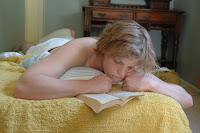Nonetheless, I do intend to try and review most of what I see at the festival this year, though I'm well aware that time constraints and other issues will cause my blog entries to become increasingly sporadic and minimal as the festival unfolds. Nonetheless, hopefully I get to write about most of the 40-odd films I plan to see. Let's give it a shot, shall we?
 THE FAIRY (dir. Dominique Abel, Fiona Gordon & Bruno Romy, France/Belgium, 2011, 93 mins)
THE FAIRY (dir. Dominique Abel, Fiona Gordon & Bruno Romy, France/Belgium, 2011, 93 mins)My first film at the 60th MIFF was the opening night feature; a wry, absurd and charming comedy set in the grimy port city Le Havre. After the disappointment of last year's opening night film, the muddled Australian rom-com The Wedding Party (which has yet to gain release either at the cinema or on DVD) I approached The Fairy with some trepidation. I need not have been so suspicious. It was delightful; a perfect film to kick off a night of celebrations at Melbourne Town Hall.
Dom (Abel) is a gangly, awkward clerk in a rundown hotel whose life is transformed when he meets the barefoot Fiona (Gordon). Claiming to be a fairy, she grants him three wishes, the first of which immediately come true.But is she really a fairy, or an escapee from the local mental hospital?
The question quickly becomes irrelevant thanks to the film's deft combination of slapstick, farce, magic realism, graceful dance sequences (one underwater, the other on a rooftop) and a charming array of characters, none of which are traditionally attractive - a refreshing change from the romantic leads in more mainstream fare.
Setting its tone almost immediately with a droll routine in which the increasingly frustrated Dom attempts to settle down with a video and and a late-night sandwich, only to be interrupted by a string of customers, The Fairy is a skillfully made comedy that gently reminds us of the plight of refugees in modern Europe, and of the power of love, without resorting to heavy-handed tactics or twee clichés.
Framed and shot in such a way that constantly reminds us we are watching a story - a deliberate reference to Abel & Gordon's earlier careers as theatre makers, perhaps - and featuring a hilarious car and scooter chase up a mountain acknowledging an earlier cinematic tradition, this whimsical film will certainly not be to everyone's tastes. Memorable, distinctive and gently madcap, it was a delightful way to get the 60th MIFF underway.
Rating: Three and a half stars





